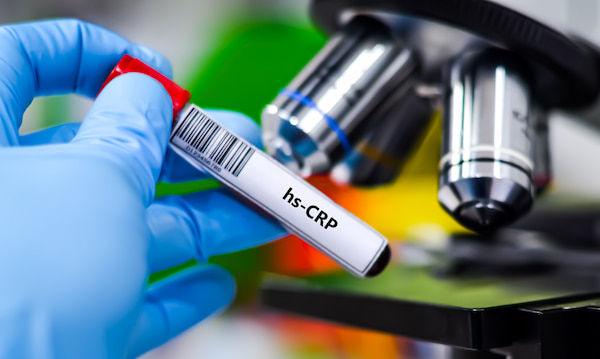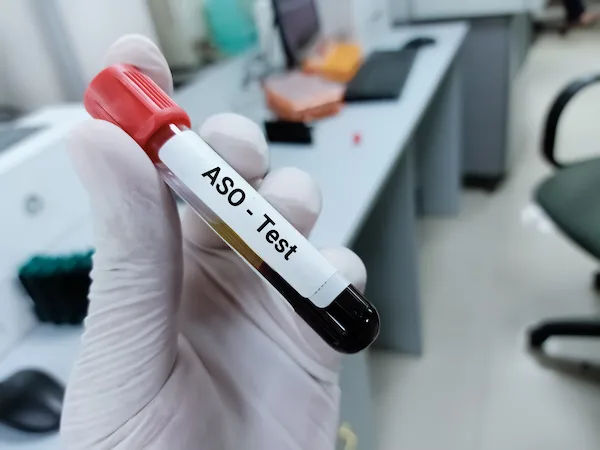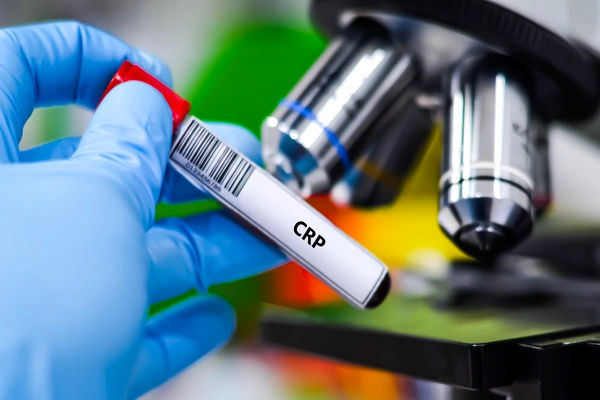Understanding High Sensitivity C-Reactive Protein
Discover the benefits of hs-CRP, causes, and symptoms of inflammation. Learn how to manage and opt for suitable treatment options.

Written by Dr. Mohammed Kamran
Reviewed by Dr. D Bhanu Prakash MBBS, AFIH, Advanced certificate in critical care medicine, Fellowship in critical care medicine
Last updated on 20th Aug, 2025
%20(2).webp?tr=q-80,f-webp,w-350,dpr-2,c-at_max 700w)
Introduction
Inflammation in the body can be diagnosed with CRP tests. The high sensitivity C-reactive protein (hs-CRP) is an extra-sensitive test to detect inflammation in your body. If you want to know what hs-CRP is and understand how it affects you.
This healthcare article will discuss details on hs-CRP, causes, symptoms, treatment options and management during inflammation.
What is hs-CRP?
High Sensitivity C-Reactive Protein (hs-CRP) is a special blood test that measures very low levels of C-reactive protein in your body. CRP is a protein made by your liver when there's inflammation somewhere in your body. The "high sensitivity" version of this test can detect even tiny amounts that regular CRP tests might miss.
Think of hs-CRP as a super-sensitive alarm system in your body. When something isn't quite right, like low-level inflammation you can't feel, this test can pick it up long before you notice any symptoms.
Why is hs-CRP Important?
Doctors use hs-CRP mainly to:
- Check heart disease risk
Even small amounts of inflammation in your blood vessels can increase heart attack or stroke risk. - Monitor chronic inflammation
Helps track conditions like arthritis or autoimmune diseases. - Assess overall health
High levels might suggest hidden health issues needing attention.
Unlike regular CRP, which detects obvious inflammation (like from infections or injuries), hs-CRP finds subtle, ongoing inflammation that could harm your health over time.
Consult General Physician for Personalised Health Advice
Symptoms to Watch For
Here's the tricky part - high hs-CRP usually doesn't cause direct symptoms you can feel. The inflammation it detects is often silent. However, conditions linked to high hs-CRP might cause:
- Unexplained tiredness
- Occasional mild aches
- Frequent minor illnesses
- Slow healing
Most people discover their hs-CRP is high during routine checkups or heart health screenings, not because they felt sick.
What Causes High hs-CRP Levels?
Many factors can raise your hs-CRP:
Common Causes:
- Heart health risks
Clogged arteries, like atherosclerosis - Metabolic issues
Being overweight, having diabetes, or having metabolic syndrome - Chronic conditions
Arthritis, lupus, and inflammatory bowel disease - Lifestyle factors
Smoking, lack of exercise, and poor diet
Temporary Raises:
- Minor infections
- Small injuries
- Stressful periods
Understanding Your Test Results
hs-CRP levels are measured in milligrams per litre (mg/L):
- Low risk: Below 1.0 mg/L
- Average risk: 1.0 to 3.0 mg/L
- High risk: Above 3.0 mg/L
Doctors usually repeat the test to confirm because levels can vary. Two high readings suggest ongoing inflammation.
How High hs-CRP Affects Your Health?
Elevated hs-CRP matters because:
1. Heart and blood vessels
Chronic inflammation damages artery walls, making plaque buildup more likely.
2. Diabetes risk
Inflammation affects how your body uses insulin.
3. Ageing process
May accelerate age-related health decline.
4. Recovery
Slows healing from illnesses or procedures.
Managing Your hs-CRP Levels
hs-CRP levels can be managed through natural ways, including the following;
Dietary Changes:
- Eat more: Colourful fruits/vegetables, fatty fish, nuts, olive oil
- Eat less: Processed foods, sugary snacks, fried items, refined carbs
- Helpful spices: Turmeric, ginger, garlic
Lifestyle Adjustments:
- Move regularly: Aim for 30 minutes of moderate activity daily
- Manage weight: Even small reductions help lower inflammation
- Quit smoking: Dramatically reduces inflammation markers
- Sleep well: Target 7-8 hours nightly
- Reduce stress: Try meditation, deep breathing, or enjoyable hobbies
Medical Options
For persistently high hs-CRP with other risk factors, your doctor might suggest:
Medications and specific treatments, including:
- Cholesterol medications (statins)
- Diabetes medications (if blood sugar is high)
- Low-dose aspirin (for some patients)
- Specific treatments for underlying conditions
When to See a Doctor?
Consider consulting a healthcare provider if:
- Your hs-CRP test shows high levels
- You have multiple heart disease risk factors (high blood pressure, cholesterol, diabetes, family history)
- You're planning to start a new exercise program (if you have elevated hs-CRP with other risks)
Final Thoughts
hs-CRP is just one piece of your health picture for inflammatory information, especially. Your doctor will consider it along with other tests and your personal health history. Many people successfully lower their hs-CRP through sustainable lifestyle changes.
Small, consistent steps toward healthier living can make a big difference in reducing inflammation and protecting your long-term health.
Consult General Physician for Personalised Health Advice
Consult General Physician for Personalised Health Advice

Dr. Mohammed Kamran
General Practitioner
5 Years • MBBS, FIDM
Nashik
Apollo 24|7 Clinic - Maharashtra, Nashik

Dr. Rohinipriyanka Reddy
General Practitioner
9 Years • MBBS
Hyderabad
Apollo 24|7 Clinic, Hyderabad

Dr Divya Lekha Gunta
General Practitioner
10 Years • MBBS, MD (Pathology)
Visakhapatnam
Apollo 24|7 Clinic - Andhra Pradesh, Visakhapatnam

Dr. Siri Nallapu
General Practitioner
5 Years • MBBS
Hyderabad
Apollo 24|7 Clinic, Hyderabad

Dr. Shesham Srinidhi
General Practitioner
5 Years • MD(physician)
Hyderabad
Apollo 24|7 Clinic, Hyderabad
(150+ Patients)
Consult General Physician for Personalised Health Advice

Dr. Mohammed Kamran
General Practitioner
5 Years • MBBS, FIDM
Nashik
Apollo 24|7 Clinic - Maharashtra, Nashik

Dr. Rohinipriyanka Reddy
General Practitioner
9 Years • MBBS
Hyderabad
Apollo 24|7 Clinic, Hyderabad

Dr Divya Lekha Gunta
General Practitioner
10 Years • MBBS, MD (Pathology)
Visakhapatnam
Apollo 24|7 Clinic - Andhra Pradesh, Visakhapatnam

Dr. Siri Nallapu
General Practitioner
5 Years • MBBS
Hyderabad
Apollo 24|7 Clinic, Hyderabad

Dr. Shesham Srinidhi
General Practitioner
5 Years • MD(physician)
Hyderabad
Apollo 24|7 Clinic, Hyderabad
(150+ Patients)



